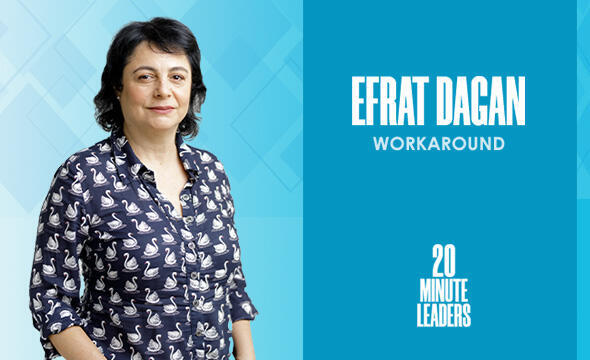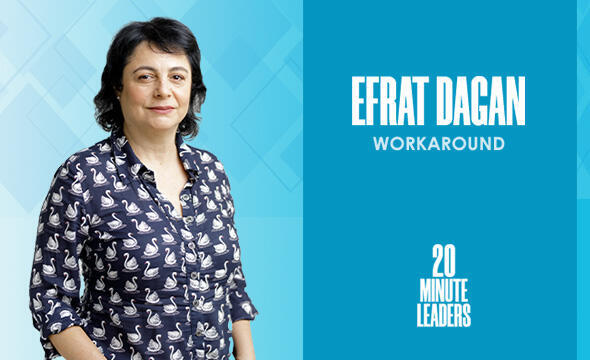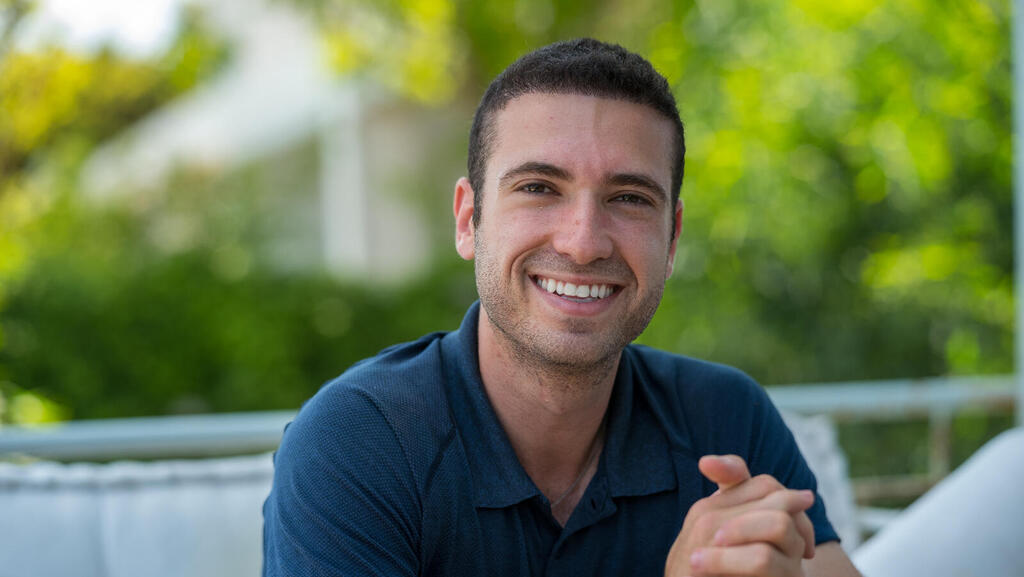
20-Minute Leaders
“It's a ‘do good’ profession because you help people find jobs.”
Interviewing candidates in the hiring process may seem like something that comes naturally, but Workaround founder and CEO Efrat Dagan says many people are not very good at it and don’t even realize it.
Interviewing candidates in the hiring process may seem like something that comes naturally to experienced managers, but Efrat Dagan says many people are not very good at it and don’t even realize it. The founder and CEO of Workaround explains that interviewing is a skill that everyone can learn and get better at, but many people never seek feedback and keep making the same costly mistakes throughout their careers. Dagan helps companies think through their hiring processes to be more effective for the organization and also better for the candidates. When the wrong person is hired, she says, it is difficult for everyone. The company loses time and money, other talent may leave, and the new hire is not happy either. Dagan shares that one reason she loves her work is because helping people find jobs that are a great fit for them makes a big difference.
What I want to focus on today is the art of building great teams. If I were to say, "I need some help. I want to build an amazing team here." What questions do you ask?
I actually spent yesterday with a team that came to me for some help around building the team because they felt that they weren't making the right hires. I think one of the most important things that is often disregarded or missed is just getting some good alignment. People who are actually working on hiring have an idea of what they are looking for, but they don't spend enough time discussing it and reaching a consensus. Each one of them has an idea of what they are looking for, but they don't have the same views. Using the disparities between them to actually understand what makes sense is a good discussion that typically moves the team forward.
We discussed the profiles of who they want to hire, the person that they are looking for, what skills they need. We really asked what this person needs to achieve and what's missing today. We looked at their current hiring process and figured out if the methods that they are using to check are actually achieving the goal, if they are using the right methods to figure out that there's enough information coming out of the process itself.
So that's one thing I ask questions about: Who do you want to hire? Why do you want to hire this person? What is this person going to do? How are they going to fit the whole organizational structure? Have they spent enough time thinking about the diversity of the talent in more ways than gender diversity? Are they thinking about the trajectory of the talent? If this person comes on to the team tomorrow, how will they grow? Do they have somewhere to stretch themselves or are they going to feel bored? What's missing in the current talent mix?
Let's talk about this question of consistency amongst a team that is looking to onboard a new person.
Consistency is important. It's especially important at scale. But if you are going to interview someone who's super talented, and each person has their interview questions, but you don't have alignment, you are not sure what you are covering. The hiring process starts to get inflated with many, many interviews, and the hiring processes seem endless. One of the reasons is because it lacks consistency; no one sat and thought, "What am I trying to figure out here? What data do I need? How am I going to get that data?" Also, you can actually make sure that the bar that you are testing people against is similar if you are hiring for the same role.
If you don't have consistency, you might be missing out on great talent because you are making decisions that are probably not great. Interviews, scientifically, are not a proven way of hiring; they have a lot of problems. You need that secret factor of consistency to make sure that decisions are sound.
If you weren't here to tell me that I'm lacking this understanding of the fundamentals, how would I know?
You would learn the hard way. Hiring mistakes, which are super expensive because the time this person worked, probably it just went to the trash. But more importantly, missed expectations. You frustrate the person; you frustrate yourself. That's not a nice or comfortable thing, having to let people go. Your product is going to suffer because you haven't reached the goals. Perhaps problems on the wider team. It has so much damage.
By the time you realize that this is a wrong hire, at that point, there’s a ripple effect.
Part of the damage can be that you might lose some great talent because you've hired someone. Also, it's wrongdoing to the person who was hired to do the job. You lose self-esteem, et cetera. It's not good for anyone.
There are methodologies to help promote consistency, right?
You asked, "How do you know?" If you find yourself having to do interviews over and over or you are finding it hard to make decisions, you don't have enough data. Or if the people that you bring on are not the right people or you are finding it hard to attract people to your company, it's probably just because you haven't really thought out everything about the hiring process. It doesn't take a lot of time; it just needs some focus and energy.
But most people think that they know how to interview, which is probably not true. It's just that you need some skills. You can learn it. But you can interview in not-the-correct way for years and you wouldn't know.
Google figured out that the years that someone spent interviewing doesn't have anything to do with the accuracy. By doing it for years without getting feedback or correcting yourself, you can continue doing the same things. A lot of companies would use the most senior person on the team as the authority on interviewing. But the CEO can lack interviewing skill, just like anyone else.
It sounds like there are some fundamental skills that you can learn, but you need somebody to guide you through that learning.
Another way that I know that a company is not doing well is by looking at their interviewing data. I'm like Dr. Pipeline. I look at funnels; I see where things get stuck or where the hiring process isn't working. It can be that you are not hiring whoever you are looking for. But it also can be the fact that you are spending so much energy until you find the right person. I spent time talking to this engineering manager a few weeks ago, and he was becoming impatient with the candidates because he was doing so many interviews. It could be solved if there is focus on it. But a lot of companies do not actually track anything or have the system overview of the hiring process; they just do it.
What did you find that candidates need to have a good experience in the process?
They need clarity. They need to have set expectations. They need to know what they are going to go through, how many interviews, what it's going to look like. They need to prepare mentally and technically for the interviews. They need to be treated with respect.
Whenever I do an interviewing workshop, I ask the people, "Did you ever have a very bad interviewing experience?" Usually the majority of people had a very terrible experience. A lot of times, it's because the hiring process is not well thought out from the candidate's perspective. You need to figure out how to make it effective but also how to make it respectful.
The easy thing is to say, "There aren't enough resources." But basically, it's just a matter of attention. Most candidates will not get an offer and you will not hire them, but they are out there and they might make a name for you that you are not interested in. It's a very small pond.
What is it about what you do that makes you so enjoy your work?
I think it matches my endless curiosity. I'm interested in people. It has a lot of problem-solving potential. There's the hunt. There's drama. The most important thing, I think, is it's a "do good" profession in my mind because you help people find jobs.
When the person that comes aboard is not the right fit, it's terrible for everyone. Maybe they think, "Oh, I wanted that job." But eventually if it's not the right match, then it probably would not be great for them either.
Michael Matias, Forbes 30 Under 30, is a Venture Fellow at Innovation Endeavors as well as investment Venture Partner at Secret Chord and J-Ventures. He studies Artificial Intelligence and Human-Computer Interaction at Stanford University, and was an engineer at Hippo Insurance. Matias previously served as an officer in the 8200 unit. 20MinuteLeaders is a tech entrepreneurship interview series featuring one-on-one interviews with fascinating founders, innovators and thought leaders sharing their journeys and experiences.
Contributing editors: Michael Matias, Megan Ryan














